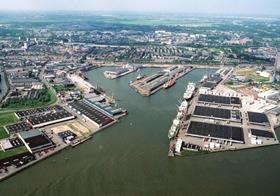
The Port of Rotterdam Authority will begin construction work on the planned Maasvlakte 2 development at the beginning of September.
The project, which involves reclaiming land in order to extend the Dutch port area out into the sea from the Hook of Holland, includes the proposed new APM container terminal, which is expected to be completed by 2013.
The news was announced by Hans Smits, Port of Rotterdam Authority CEO, during the company's presentation of its half-yearly figures.
According to Mr Smits, the Port Authority now has all the necessary permits in place for the development, although a limited number of appeals have been lodged relating to the use of Maasvlakte 2 and to measures for protecting the environment.
After fifteen years of planning and preparation, a start will now be made on dredging sand in the Yangtzehaven area using a cutter suction dredger’.
The sand will then be transported, via a pressure pipeline, to the place where the APM terminal is to be built, to the north of the Slufterstrand.
Soon afterwards, the first hopper dredger will begin to build coastal defences off the coast.
Over a year ago, contracts had already been signed for more than 40 per cent of the project's planned sites, including the APM terminal, as well as the RWG and Euromax terminals.
The new development is expected to meet recent increases in demand on the deep-water container market. 'The space that Maasvlakte 2 will shortly provide is desperately needed,' added Mr Smits.
In the first six months, operating results for the Port of Rotterdam Authority were € 17 million up, to € 110 million, on the same period of 2007. This is due to a sharp rise in revenues and a marked improvement in results from participating interests. In the first half of 2007, the latter were negative due to a one-off downward value adjustment.
The trend in operating results is in line with the Business Plan 2006-2010. This plan anticipates an increase in results and returns necessary to meet the Port Authority’s extensive financial commitments for the medium term, for example in connection with the construction of Maasvlakte 2.
In comparison with the first half of 2007, port dues and revenue from contracts yielded 8% (€ 19 million) more. This was mainly the result of increased transshipment and the limited effect of tariffs. Business costs remained at the same level.
Meanwhile, the increasing containerisation of fresh produce shipments into northern Europe has contributed to an overall decline in the volume of general cargo passing though the Dutch port of Rotterdam during the first half of 2008, port officials have revealed.
While the termination of the so-called LASH (lighter aboard ship) barge system at the end of last year accounted for the majority of an 18 per cent year-on-year downturn in other general cargo to 900,000 tonnes, Rotterdam's Port Authority said it had also noted a fall in the volume of fruit being handled.
'The increasing containerisation of fruit, and for some time non-ferrous metals too, is eating away at the total,' the Port Authority said, adding that it was 'seeking to compensate for this, primarily in the transshipment of iron and steel, paper and project cargo'.
During the first six months of the year, a total of some 213m tonnes of cargo were handled in the port, 7.7 per cent more than in the same period of 2007. Outgoing trade was 5.2 per cent up, incoming trade up 8.6 per cent. Bulk cargo throughput increased by 9.3 per cent, over twice as much as general cargo (4.4 per cent).
In the first six months, operating results for the Port of Rotterdam Authority were up €17m on the year-earlier period to €110m, due to a sharp rise in revenues and a marked improvement in results from participating interests.
'The trend in operating results is in line with the Business Plan 2006-2010,' the authorty said. 'This plan anticipates an increase in results and returns necessary to meet the Port Authority’s extensive financial commitments for the medium term, for example in connection with the construction of Maasvlakte 2.'
In comparison with the first half of 2007, port dues and revenue from contracts yielded 8 per cent (€19m) more, mainly as a result of increased transshipment and the limited effect of tariffs. Business costs remained at the same level, the authority added.
Hans Smits, Port of Rotterdam Authority CEO: “These are the best half-yearly results for the past ten years, with a second quarter that was even slightly better than the first,' he said.
'The second half of the year has got off to an encouraging start, but the port won’t be able to escape the effects of the falling economic growth in Asia in particular, and to a lesser extent Western Europe.
'On the other hand, a complete port like Rotterdam can continue to benefit from those countries or sectors which are continuing to grow (more),' he added. 'We are strengthening our position, for example in the Baltic area, in biofuels and in steel. All in all, I therefore remain optimistic and expect us to show 4 per cent growth for the year as a whole. Around 420m tonnes in throughput.'






No comments yet